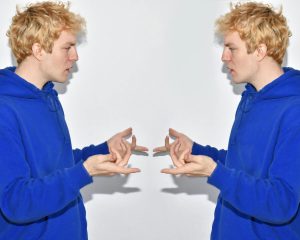Dance club music doesn’t normally tell a story with words. It doesn’t entertain for several minutes with any musical concept, beyond the desire to dance. Yet, Robert Robert counts on a rare, opposite approach. His debut album, Hoodie bleu ultra, takes us on a journey, from beginning to end, of an alcohol-fuelled night where we Uber from one party to the next.
 “[Dance] Club music also exists in the context where it’s played,” says Arthur Gaumont-Marchand, a.k.a. Robert Robert. The rhythms to which we dance often carry us towards such alcoholized circumstances, punctuated by sporadic flashes of light that slash the darkness with only momentarily. It’s not a genre of music we usually take time to understand. Yet…
“[Dance] Club music also exists in the context where it’s played,” says Arthur Gaumont-Marchand, a.k.a. Robert Robert. The rhythms to which we dance often carry us towards such alcoholized circumstances, punctuated by sporadic flashes of light that slash the darkness with only momentarily. It’s not a genre of music we usually take time to understand. Yet…
“The people you meet during a night like that are important,” says Robert Robert. “They’re part of club music. If you’re like me, and clubs have been a second home for you for a long time, all of your stories are rooted in that music. Clubs are where you met your best friends, found your passions, and the people in your life.” Hence, for him, the necessity of finding the words to tell the stories behind those noisy, dancing nights.
A story, an adventure, an experience. That’s what Robert Robert wants to describe, using his rhythmic, dance-inducing music. Following two EPs and a two-song project launched in late 2019, the singer-songwriter and producer was ready to tell his story over eight songs.
“A friend told me the story of a second date that never happened because the girl never showed up,” he says. “And she left with his blue hoodie the first time. I had a recording of that on my phone. I love the feeling of someone telling me about their night. Following them through all the people they met and the places they went, I thought it really portrayed my universe quite well.” And that’s how, as uncommon a proposition as it may be, RR decided to give a story to the rhythms that have defined his music for so long.
And even though he’s a longtime favourite of the Montréal electronic-music scene, his talent has soared in France where, as a matter of fact, his record label is located. “A lot of people make music like mine in France,” he says, adamant that his project is much more mainstream on the other side of the Atlantic Ocean. “They have a very different rapport to electronic music over there. With this album, I wanted to do something that’s closer to home. I’d like to be able to say that I participate in the music of where I’m from.” He feels that by placing his voice on dance rhythms, he’s injecting part of his identity in the mix. His words take him back home, in a way.
By collaborating with Canadian artists, or at the very least showing interest in their projects, Robert Robert realized that his ideas maybe weren’t as far from what’s going on here as he thought. “I really like Lydia Képinski and Les Louanges, for example. I wondered if I could come up with something I like that would include those people, and found out that it’s possible,” he says.
“I started playing with my voice in 2014, but singing is a new trade for me. It’s so different than producing tracks. Using vocals more and more over time lead me to have enough confidence to get to this project.” The artist believes that adding a voice is disadvantageous, but he was adamant that he wanted to do it to fulfill his desire to express specific things. “Words help paint a better picture,” he says. “But if you sing with a masculine voice, people tend to imagine the person, the guy. It’s possible you’ll no longer recognize yourself. And then your track takes on a new meaning. That’s what I like about using lyrics in club music. It allows you to be more emotional in a musical context that’s colder.”
And even though his music is generally heard in dense crowds, where people are closer to him and each other, Robert Robert will have to, like all of us, continue living the coming months from a safe distance. Distance, however, takes on a new meaning when it prevents you from giving your music the life it deserves. “I’m anxious to carry on, but there’s always a way to benefit from that music,” he believes. “It can exist at home, at a party, outdoors. It can exist anywhere.”